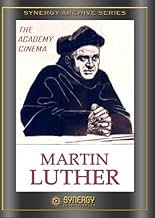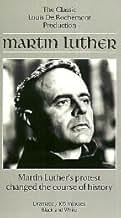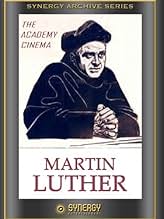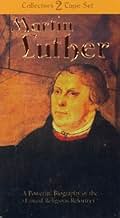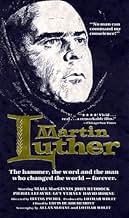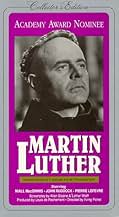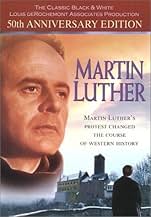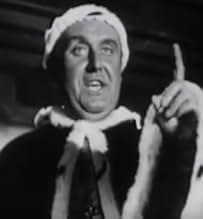Cinebiografia do padre alemão Martinho Lutero (Niall MacGinnis), cobrindo sua vida entre 1505 e 1530 d.C., e o nascimento do movimento da Reforma Protestante.Cinebiografia do padre alemão Martinho Lutero (Niall MacGinnis), cobrindo sua vida entre 1505 e 1530 d.C., e o nascimento do movimento da Reforma Protestante.Cinebiografia do padre alemão Martinho Lutero (Niall MacGinnis), cobrindo sua vida entre 1505 e 1530 d.C., e o nascimento do movimento da Reforma Protestante.
- Direção
- Roteiristas
- Artistas
- Indicado a 2 Oscars
- 1 vitória e 4 indicações no total
- Carlstadt
- (as Allastair Hunter)
- Katherine von Bora
- (as Annette Carrell)
Avaliações em destaque
With the camera in the able hands of Oscar-nominated Joseph Brun, Niall MacGuinness gives a performance of evangelical zeal in what was probably his only leading role in a film.
MARTIN LUTHER is a curious collaboration between three countries – the U.S., Germany (from where Martin Luther himself emanated) and the U.K.; in fact, while the director (and bit-part actor) Irving Pichel is an American, the lead here is played – superbly, I might add – by the Irish character actor Niall MacGinnis (perhaps best-known for his chilling portrayal of Karswell, the occult-practicing villain of Jacques Tourneur’s CURSE OF THE DEMON [1957]). His thoughtful performance is very effective in illustrating the various facets of Luther’s personality: his initial inner conflicts, the laying-down of (and firm conviction in) his own beliefs, as well as the strength necessary for opposing the power of the Church (facing disrepute from both his peers and his congregation, not to mention an eventual excommunication). Furthermore, we’re also shown the build-up of support to his particular credo where it attracts people from all walks of life…and even lands him a wife!
The script does quite well in delineating the essential difference between the doctrine of the Catholic Church (in its most oppressive state, back when it was still a political force to be reckoned with) and Luther’s pragmatic but no less steadfast approach to religion: the latter favors a strict adherence to Scriptures in the face of the Church’s fire-and-brimstone teachings (resorting to the deception of ignorant parishioners by proposing the worship of worthless holy relics and the offer of money in order to obtain indulgences in the afterlife, or the callous bestowing of titles upon non-clerical albeit aristocratic subjects).
When I was in Hollywood in 2005, I had caught LUTHER (1974) on TV: directed by Guy Green from a stage rendition by John Osborne and featuring Stacy Keach in the title role, it’s been released on DVD by Kino as part of “The American Film Theater Collection”. While that version, too, was undeniably interesting and effective, the earlier cinematic i.e. less stagey treatment was perhaps the more satisfactory; by the way, there’s been an even more recent biopic of the famous religious figure starring Joseph Fiennes, which is readily available from my local DVD rental outlet.
The costumes, sets and hairstyles were authentic and help transport the viewer to the past very effectively.
Luther's message and wisdom are amply portrayed and serve as a basis for anyone to examine their beliefs.
The film does not suffer from dating, even though it was made over 50 years ago. The black and white imagery imparts a sense of timelessness, worthy of the subject matter. The acting is, almost without exception, very natural and believable.
Você sabia?
- CuriosidadesThis movie was never released in Québec, Canada. At the time, Québec's movie censorship board (made up entirely of French-speaking Catholics) refused to approve this movie to be shown in Québec's movie theaters. Therefore, it could only be shown in the basements of Québec's Protestant churches.
- Citações
Dr. Eck: Martin Luther! Do you think you are the only one who knows the truth?
Martin Luther: I will tell you what I think. I have the right to believe freely. To be a slave to no man's authority. To confess what appears to me to be true whether it is proved or disapproved, whether it is spoken by Catholic or by heritic.
Dr. Eck: Then you deny the authority of the pope!
Martin Luther: In matters of faith, I think that neither council, nor pope, nor any man has power over my conscience. And where they disagree with scripture, I deny pope and council and all. A simple layman armed with scripture is greater than the mightiest pope without it.
Dr. Eck: Heresy, Doctor Luther! Heresy!
Martin Luther: Heresy? So be it. It is still the truth!
- ConexõesFeatured in Wormwood: Chapter 2: A Terrible Mistake (2017)
Principais escolhas
- How long is Martin Luther?Fornecido pela Alexa
Detalhes
- Data de lançamento
- Países de origem
- Idioma
- Também conhecido como
- Martinho Lutero
- Locações de filme
- Empresas de produção
- Consulte mais créditos da empresa na IMDbPro
Bilheteria
- Orçamento
- US$ 500.000 (estimativa)
- Tempo de duração1 hora 45 minutos
- Cor
- Mixagem de som
- Proporção
- 1.37 : 1
Contribua para esta página


